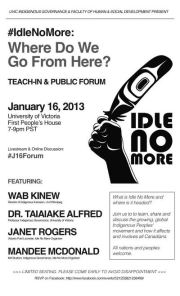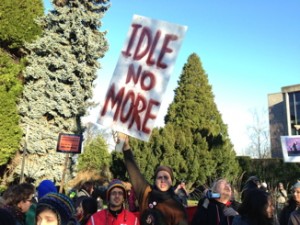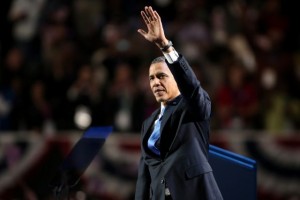“We have reached a nexus point where Indigenous land rights, environmental justice and human survival all collide.” “It is here, at this point of collision, that we have the opportunity to facilitate real change as the various collectives — like we’re seeing around this room — of effective parties are thrown together in a literal fight for human survival.” Sherri Mitchell, Director, Land Peace Foundation
The Maine Campus, Dominique Scarlett, February 18, 2013 — On Wednesday, Feb. 13, the Women’s Studies program hosted “Idle No More: Building Multi-Ethnic and Multi-Generational Networks of Women,” the third in a series of their Women in Curriculum, or WIC spring lunch lectures, in the Bangor Room of the Memorial Union.
Sherri Mitchell, the director of the Land Peace Foundation, and Maria Girouard, assistant coordinator for student development at the University of Maine’s Wabanaki Center, presented the lecture, which focused on the “Idle No More” movement, recent controversial Canadian legislation and the need for supportive allies within the movement.
“Idle No More” is a grassroots movement that protests legislative abuses to the rights of aboriginal and indigenous people in Canada, which consist of First Nations, Metis and Inuit people.
“We have reached a nexus point where Indigenous land rights, environmental justice and human survival all collide,” Mitchell said during the presentation. “It is here, at this point of collision, that we have the opportunity to facilitate real change as the various collectives — like we’re seeing around this room — of effective parties are thrown together in a literal fight for human survival.”
The movement was formed in late 2012 by a group of female activists who organized a series of “teach-ins,” a form of non-violent protest where participants engage in free discussion about a controversial topic, to protest the induction of Canada’s C-45 bill.
The activists believe the controversial bill weakens environmental protection laws — particularly those that protect navigable waterways, many of which surrounded land that belongs to the First Nations.
“We have one planet. The type of destruction that we are facing respects no boundaries, it knows no division,” Mitchell said. “Therefore, if we hope to survive, we must eliminate all divisions between us. We must be allies and work collectively to stop these archaic practices of domination in the greed-driven industry that is threatening our planet and destroying all life.”
Mitchell argued that several policy measures, led by Canadian Prime Minister Stephen Harper, violate the rights of the indigenous and aboriginal people of Canada.
“[Harper’s] goal is to completely get rid of all people that identify as indigenous or aboriginal in Canada so that nobody has that status, because there are certain protections that are afforded under the law as a result of that status,” Mitchell said.
She spoke of the implementation of a three-tier policy strategy that, through several proposed and passed policy measures, negotiates with First Nations to sign new agreements that terminate their status as First Nations, eliminate funding and remove all funding for legal consultation.
She spoke of the steps that everyone could take to become involved in the environmental, indigenous and aboriginal rights movements.
“Educate yourself about the issues, attend informational sessions, do the research, talk to people, seek advice from the group for which you’re being an ally [and] listen to their critique of what you’re doing,” Mitchell said.
Read More: The Maine Campus

 Follow
Follow




Net Zero Workers
There is a long history of wage freezes for workers that amount to wage cuts against rapidly rising costs of living. There was a time when governments were interested in supporting unions defending wages as a base for fair compensation for the work and a wage increase to maintain a decent standard of living against rising costs. In bad times, unions and employers could give and in depressions the unemployed ranks grow, families collapse, and businesses fold. Currently, governments are finessing to have it both ways. A psychology of governing parties is to assure consumers and investors that the economy is always looking up while convincing workers that the coffers are empty and the economy is recessing. While Athens burns business analysts comment daily that the markets are gaining lost ground. ‘Economic growth is on the horizon while we are pressed to freeze wages and put our fiscal house in order.’ Mixed messages for the consumer as worker, now the net zero worker.
“Net zero,” newspeak for wage freeze, was introduced as a mantra in about 2002 and repeated by the Public Sector Employers’ Council (PSEC) in British Columbia from 2008 to this current point. In 2010 the “net zero mandate” was reinforced in BC government or PSEC policy. Public sector workers were again net zero workers. The BCTF rallied hard against this and are standing up again to pool together all unions, as the governing party in BC again designated teachers as net zero workers. Let them bargain, let them mediate, Minister of Education George Abbott insisted in legislative debate on 12 March, as long as “all of that is within the context of net zero.”
Thirty years ago, top executive salaries were about 15 times that of the average worker’s. Now, those executive salaries are 75 times that of the worker’s. It’s increasingly difficult to accept one’s fate as a net zero worker in the face of skyrocketing executive salaries and lawless mismanagement. Of course, things might change should the net zero worker threaten to become a net zero consumer. Net zero spending was once called a boycott.
10 Comments
Posted in BC Education, Commentary, Employment rights, Government, Politics, Solidarity, Strikes & Labor Disputes, Unions, Working conditions
Tagged Economic Trends, Government, Working conditions